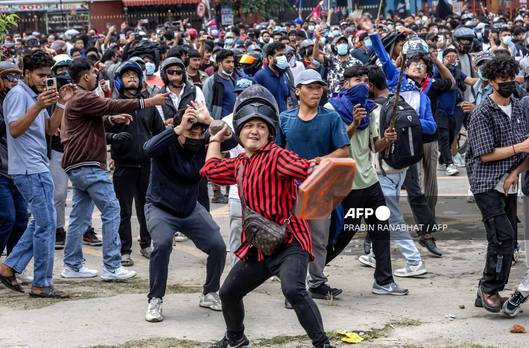The eruption of protests in Kathmandu, Nepal, on Monday, October 23, 2024, sparked international concern and condemnation following reports of police violence against demonstrators. The protests were triggered by the Nepalese government’s decision to block access to 26 unregistered social media platforms, including major platforms like Facebook, YouTube, and X (formerly Twitter), on Friday, October 20, 2024. Thousands of young Nepalese citizens, frustrated by the social media ban, took to the streets to express their discontent, leading to a clash with security forces.
The events of Monday quickly escalated as protesters attempted to breach a restricted area near the parliament building. Police responded with force, deploying rubber bullets, tear gas, water cannons, and batons to disperse the crowds. However, amidst the chaos, disturbing reports emerged of police using live ammunition against the demonstrators. Amnesty International and firsthand accounts from protesters alleged that live rounds were fired into the crowd, contributing to the mounting death toll. A police spokesperson confirmed 17 fatalities, while the UN human rights office received numerous allegations of excessive and disproportionate use of force by security personnel.
The United Nations swiftly reacted to the violence, demanding a prompt and transparent investigation into the killings and injuries. Ravina Shamdasani, a spokesperson for the UN human rights office, expressed shock at the events and emphasized the need for accountability. The UN called on Nepalese authorities to respect and protect the fundamental rights of peaceful assembly and freedom of expression, underscoring the importance of adhering to international standards for the use of force by law enforcement. Furthermore, the UN urged the Nepalese government to reconsider its approach to regulating social media, ensuring that any measures taken are consistent with the country’s human rights obligations.
The social media ban, the catalyst for the protests, stemmed from the government’s move to regulate online platforms, ostensibly by targeting unregistered sites. However, the move was met with widespread criticism, seen by many as an attempt to stifle dissent and control information flow. Nepal, a country with a history of political activism and a relatively vibrant civil society, saw the social media restrictions as an infringement on fundamental freedoms. The blocking of popular platforms like Facebook, YouTube, and X further amplified public anger, igniting the protests that ultimately led to the tragic confrontation with security forces.
The incident highlighted the growing tension between governments and digital platforms, particularly concerning the regulation of online content and the protection of freedom of expression. While governments often cite concerns about misinformation, hate speech, and national security as justifications for regulating social media, critics argue that such measures can easily be misused to suppress dissent and limit access to information. The situation in Nepal serves as a stark reminder of the potential consequences of heavy-handed approaches to online regulation and the vital importance of upholding fundamental rights in the digital sphere.
The aftermath of the protests left Nepal grappling with the fallout from the violence and the underlying issues that fueled it. The international community continued to call for accountability and transparency in the investigation of the police actions. The incident underscores the delicate balance between maintaining public order and protecting fundamental human rights, particularly in the context of rapidly evolving digital landscapes. The Nepalese government faced the challenge of addressing the concerns raised by the protests while upholding its commitment to democratic principles and international human rights standards. The events of October 23, 2024, serve as a cautionary tale about the potential dangers of restricting online freedoms and the importance of engaging in constructive dialogue to address public concerns in a democratic society.


